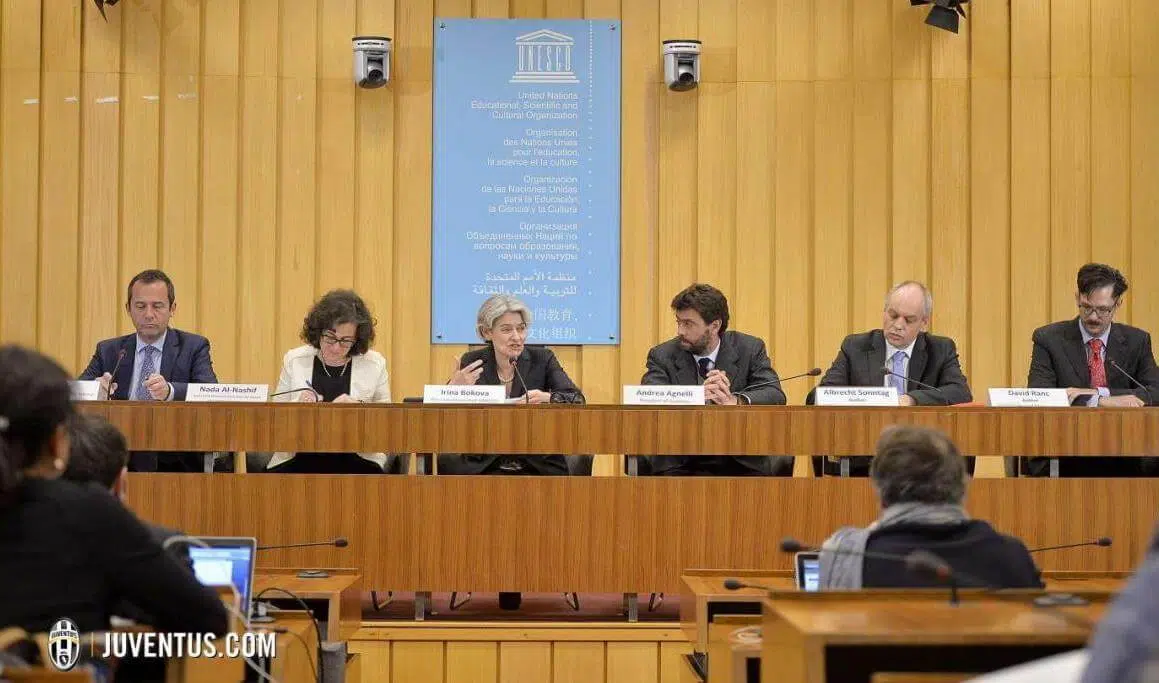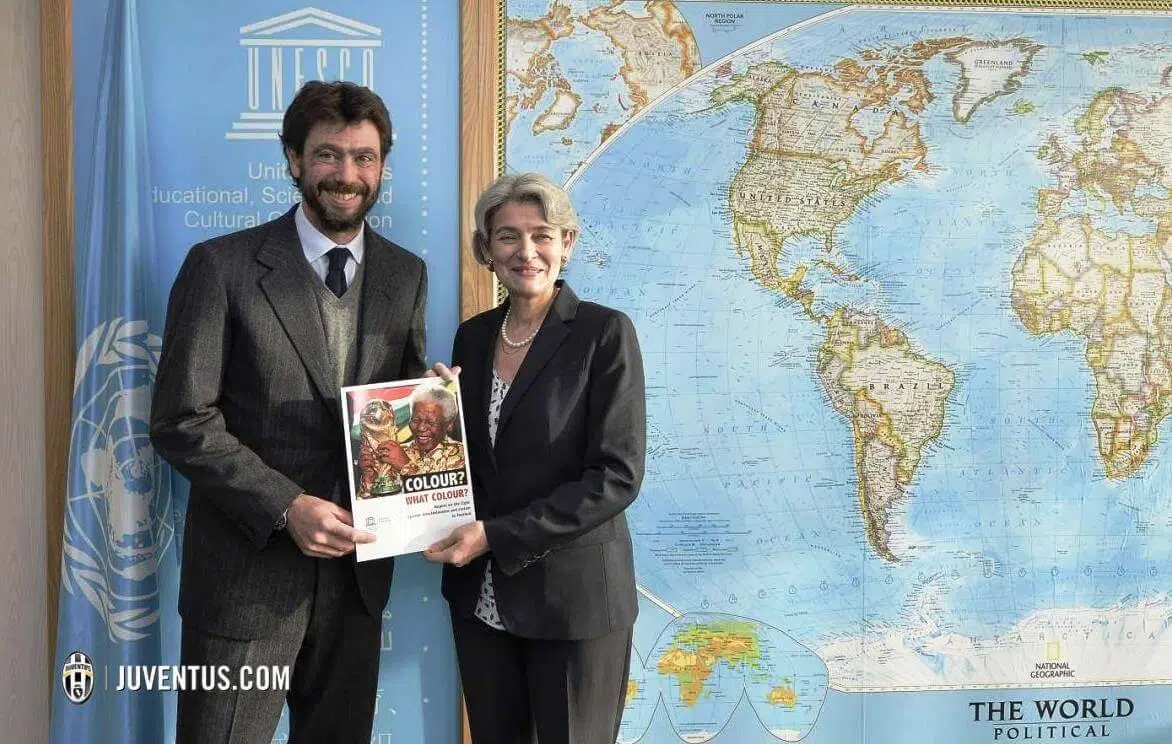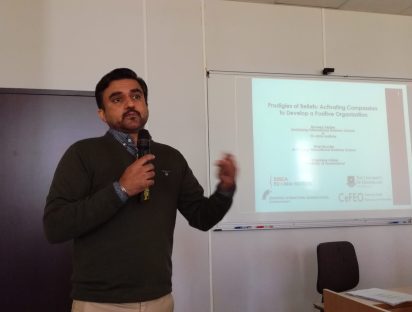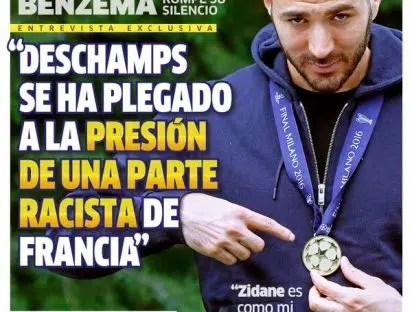- Texte en français en bas de la page.
On Friday 27 November the first ever UNESCO report on racism and discrimination in international football, authored by Albrecht Sonntag and David Ranc, was presented at a press conference in Paris in the presence of Irina Bokova, General Director of UNESCO et Andrea Agnelli, president Juventus FC. The famous football club from Turin had been at the origin of this initiative, which was commissioned within the framework of a long-term partnership with UNESCO.
Under the title ‘Colour? What colour?’, the report of 80 pages is based on an interdisciplinary research approach that draws on theories from social psychology, anthropology and sociol-linguistics in an endeavour to understand the paradox that consists in the persistance of racism and discrimination in a sport that is at the same time a powerful vehicle of diversity, social inclusion and education. The study is completed by an inventory, established par Antonella Forganni, of the legal dispositions that deal with the issue, as well as an empirical survey based on a large variety of expert interviews in different countries.
In accordance with the mandate given by UNESCO and Juventus FC the report is not limited to analysing the obstacles and barriers that prevent a more efficient fight against phenomena and behaviour patterns that have existed for a long time in football but that are simply no longer acceptable. In addition, it establishes a benchmark of good practices in some major footballing nations that would deserve being better shared across borders. It concludes on a series of concrete recommendations. Most notably the report demands the end of collective sanctions, which are counter-productive and not compatible with the ethical standards of liberal democracy. The systematic individualisation of sanctions is now technically possible and should become the norm.
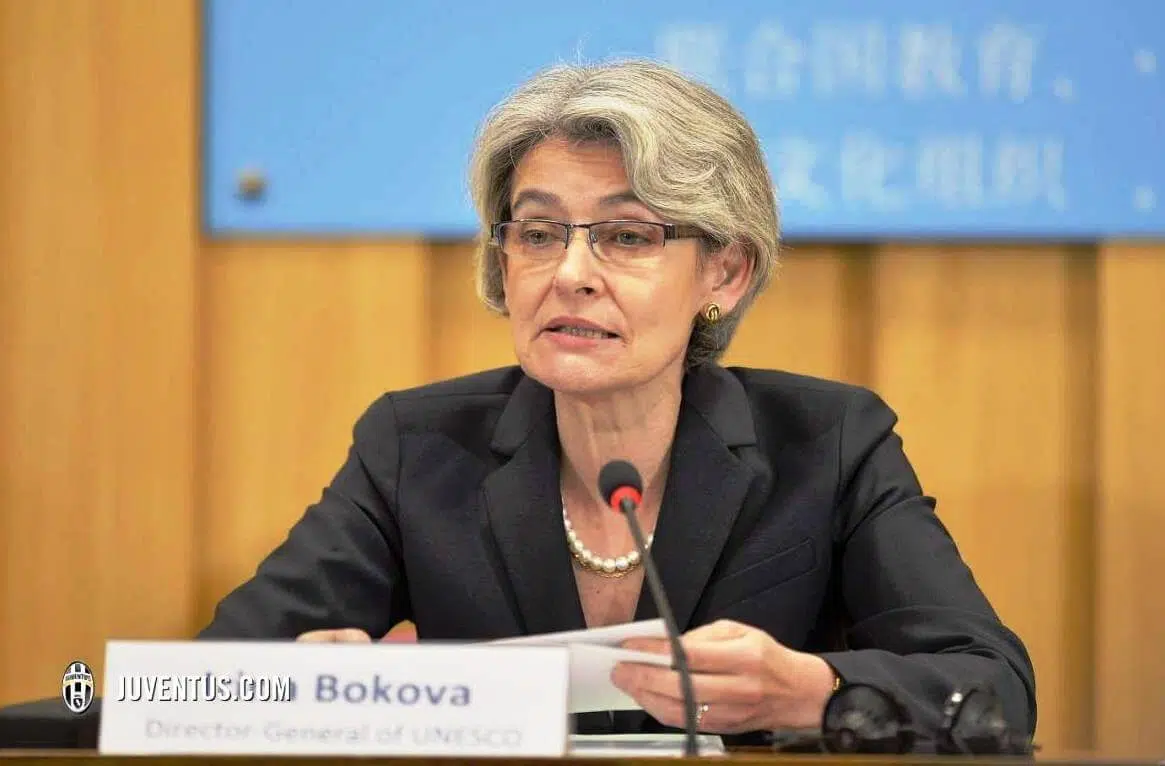
As Irina Bokova reminded the audience, ‘the fight against racism and discrimination has been at the heart of UNESCO’s mandate for 70 years’. While football is plagued by these phenomena, it also ’embodies the best of humanity: it is the world’s most diverse sport, rigorously meritocratic and driven by fair play and discipline. It can be an unparalleled vehicle for social inclusion, gender equality and youth empowerment.’ It is precisely the objective of this report to enable football to fully exploit this unique potential for the good of society.
- The report can be downloaded in PDF format here.
- URL: https://www.essca-knowledge.fr/wp-content/uploads/sites/4/2015/11/UNESCO-Report-Sonntag-and-Ranc-Nov.-2015.pdf
- An executive summary in German can be downloaded here.
Vendredi 27 Novembre, le premier rapport de l’UNESCO sur le racisme et la discrimination dans le football international, élaboré par Albrecht Sonntag et David Ranc, a été présenté lors d’une conférence de presse en présence d’Irina Bokova, Directrice Générale de l’UNESCO et Andrea Agnelli, président de la Juventus de Turin. Le célèbre club transalpin avait en effet été à l’origine de cette initiative, dans le cadre d’un partenariat avec l’UNESCO qui s’inscrit dans la durée.
Intitulé « Couleur ? Quelle couleur ? », le rapport de 80 pages est basé sur une recherche interdisciplinaire approfondie, mobilisant des théories psycho-sociologiques, anthropologiques et socio-linguistiques. Il s’agit de comprendre le paradoxe qui consiste à constater la persistance du racisme et de la discrimination dans un sport qui sert en même temps de puissant vecteur d’intégration sociale et d’éducation. L’étude est complétée par un inventaire, établi par Antonella Forganni, des outils juridiques en place dans une sélection de pays, ainsi que par une enquête de terrain comprenant des interviews d’une grande variété d’experts dans de nombreux pays.
Conformément à la mission confiée aux auteurs par l’UNESCO et la Juventus, le rapport ne se borne pas à analyser les obstacles et les barrières qui se dressent encore devant ceux qui souhaitent lutter de manière plus efficace contre des phénomènes et des comportements qui existent depuis longtemps dans le football mais qui ne sont tout simplement plus admissibles. Il établit une liste de bonnes pratiques dans plusieurs pays majeurs du football, pratiques qui mériteraient d’être mieux partagées, et il conclut avec une série de recommandations concrètes. Il revendique notamment la fin des sanctions collectives, contre-productives et éthiquement inacceptable. L’individualisation systématique des sanctions est aujourd’hui techniquement possible et devrait devenir la norme.
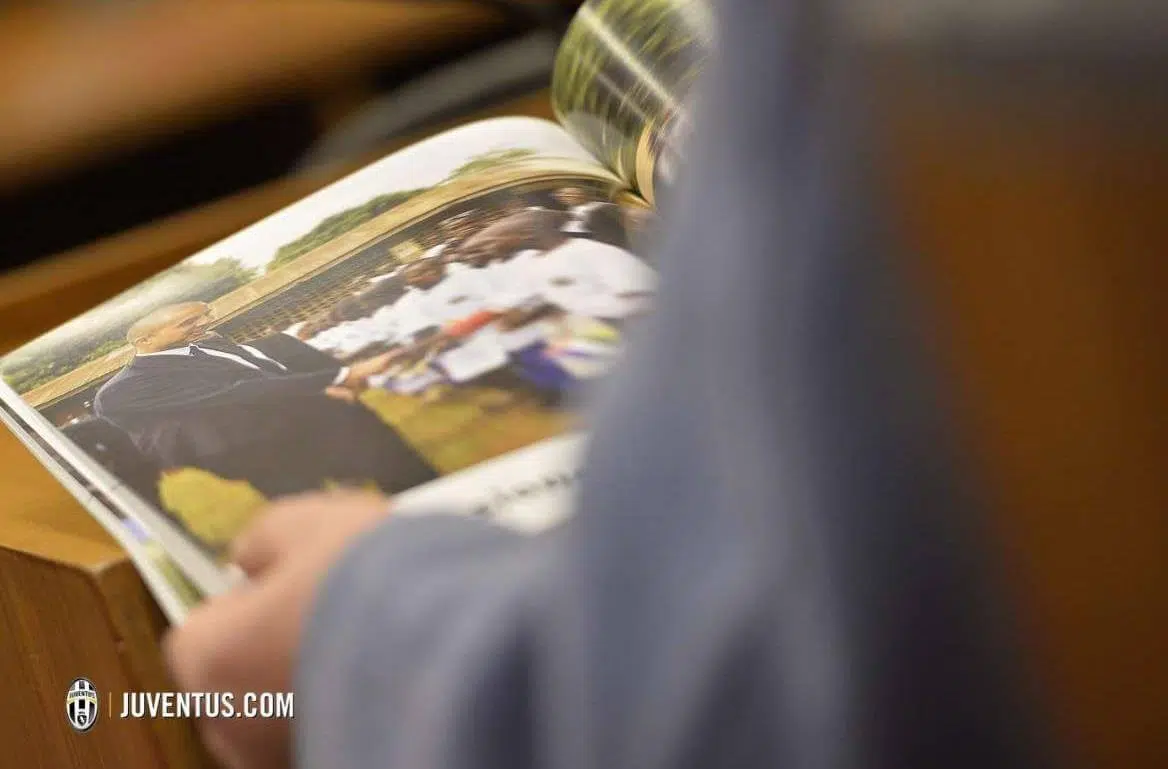
Comme l’a rappelé Irina Bokova, « la lutte contre le racisme et la discrimination a été au coeur du mandat de l’UNESCO depuis 70 ans ». Le football souffre de ces maux, mais en même temps, « il incarne le meilleur de l’humanité: c’est le sport le plus divers du monde, rigoureusement méritocratique, et animé par le fair-play et la discipline. Il peut être un vecteur inégalé d’inclusion sociale, d’égalité des sexes et d’intégration des jeunes ». Permettre au football d’exploiter pleinement ce potentiel unique, c’est là précisément l’objectif de ce rapport.
- Le rapport – en langue anglaise – peut être téléchargé sous format PDF en cliquant ici.
- URL: https://www.essca-knowledge.fr/wp-content/uploads/sites/4/2015/11/UNESCO-Report-Sonntag-and-Ranc-Nov.-2015.pdf
- Une executive summary en français est téléchargeable en cliquant ici.
- Pour une executive summary en allemand, cliquer ici.

